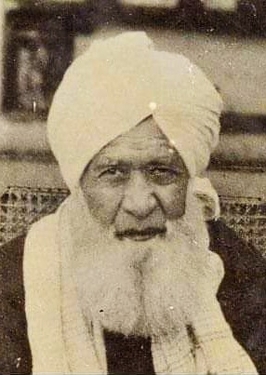
Abul Qasim Nomani is an Indian Islamic scholar and the current Vice Chancellor and Sheikh al-Hadith of Darul Uloom Deoband. He has been ranked among the 500 most influential Muslims in the world.

Jamia Islamia Ishaatul Uloom is an educational institution located in Akkalkuwa, Nandurbar District, Maharashtra, India. Established in 1979 by Ghulam Mohammad Vastanvi, the institution provides a combination of traditional Islamic education and contemporary academic disciplines, including engineering, medicine, and pharmacy.

Al-Jamia Al-Islamia Darul Uloom Waqf Deoband is an madrasa situated in the Indian town of Deoband. It was established by scholars led by Muhammad Salim Qasmi and Anzar Shah Kashmiri in 1982 as a result of administration disputes in Darul Uloom Deoband during 1980–1982. As of 2021, Muhammad Sufyan Qasmi is its rector.

Muhammad Salim Qasmi Siddiqi was an Indian Muslim scholar who co-founded the Darul Uloom Waqf in Deoband, India and served as its first rector. He was an alumnus of Darul Uloom Deoband. He received the fourth Shah Waliullah Award and was honoured with the Mark of Distinction from the Al-Azhar University in Cairo, Egypt.
Saeed Ahmad Akbarabadi was an Indian Islamic scholar and an Urdu-language author who co-founded the Nadwatul Musannifeen. He served as the dean of the Faculty of Theology in Aligarh Muslim University.
Zayn al-Abidin Sajjad Meerthi (1910–1991) was an Indian Sunni Muslim scholar and historian and head of the Islamic studies department of Jamia Millia Islamia. His book Tarikh-e-Millat is required reading in the syllabus of Darul Uloom Deoband and in madrasas affiliated with it.
Marghoobur Rahman was an Indian Muslim scholar and Vice-Chancellor of Darul Uloom Deoband.

This bibliography of Darul Uloom Deoband is a selected list of generally available scholarly resources related to Darul Uloom Deoband, a leading Islamic seminary and Muslim theological centre in India at which the Deobandi movement began, founded in 1866. It is one of the most influential reform movements in modern Islam. It created a largest network of satellite madrasas all over the world especially India, Bangladesh, Pakistan, Afghanistan neighboring countries in Asia and beyond, and as far afield as the Caribbean, South Africa, United Kingdom and the United States. Islamic Revival in British India by Barbara D. Metcalf was the first major monograph specifically devoted to the institutional and intellectual history of Deoband. Syed Mehboob Rizwi wrote History of Darul Uloom Deoband in 1977 in 2 volumes. This list will include Books and theses written on Darul Uloom Deoband and articles published about Deoband in various journals, newspapers, encyclopedias, seminars, websites etc. in APA style. Only bibliography related to Darul Uloom Deoband will be included here, for Deobandi movement, see Bibliography of Deobandi Movement.

Wahīduzzamān Kairānawi (1930–1995), also spelt as Waheed-uz-Zaman Keranvi, was an Indian Islamic scholar, writer, lexicographer, and professor who specialised in Arabic. He spent around 27 years instructing Hadith and Arabic at Darul Uloom Deoband.
Muhammad Ismail Katki was an Indian Islamic scholar and writer. He was associated with the Khatm-e-Nubuwwat movement in India, particularly in the state of Odisha. He served as the first Ameer-e-Shari'at of Imarat-e-Shar'ia Odisha and the third president of Jamiat Ulama Odisha.
Syed Siraj us Sajideen Katki, also known as S.S. Sajideen Qasmi, was an Indian Islamic scholar, poet, and orator. He dedicated almost his entire career to Jamia Islamia Markazul Uloom, Sungra. He also served as the 4th President of Jamiat Ulama Odisha and the second Amīr-e-Sharī'at of Imārat-e-Shar'ia, Odisha.

Muhammad Ibrahim Balyawi (1887–1967), also spelt as Muhammad Ibrahim Balliavi, was an Indian Sunni Muslim scholar who served as the 6th Principal of Darul Uloom Deoband. He spent almost 50 years instructing Hadith, Mantiq, Islamic philosophy, and other subjects at Darul Uloom Deoband.
Muhammad Arif Jameel Mubarakpuri, is an Indian Islamic scholar and Arabic and Urdu language writer. He is a professor of Arabic language and literature at Darul Uloom Deoband. He is the current Editor-in-Chief of Arabic monthly, Al-Daie.
Muhammadullah Khalili Qasmi is an Indian Islamic scholar, mufti, writer, and trilingual translator of Urdu, Arabic, and English. He is an alumnus of Darul Uloom Deoband, Markazul Maarif, Jamia Millia Islamia, Maulana Azad National Urdu University, and Jamia Hamdard; and has written several books in English, Urdu, and Arabic.
Sharif Hasan Deobandi was an Indian Islamic scholar and Muhaddith. He served as Sheikh al-Hadith at Darul Uloom Deoband from 1972 to 1977. He also worked as a professor of Hadith and Sheikh al-Hadith at Jamia Islamia Talimuddin in Dabhel for almost ten years.
Ghulām Rasool Hazārvi was an Indian Islamic scholar and one of the earliest teachers of Darul Uloom Deoband. He served as a teacher in Darul Uloom Deoband for about thirty one years. His teachers included Syed Ahmad Dehlavi and Mahmud Hasan Deobandi. His students included Abdur Rahim Popalzai, Anwar Shah Kashmiri, Asghar Hussain Deobandi, Hussain Ahmad Madani, Izaz Ali Amrohi, Kifayatullah Dehlawi, Manazir Ahsan Gilani, Muhammad Sahool Bhagalpuri, Muhammad Tayyib Qasmi, and Shabbir Ahmad Usmani.
Habibur Rahman Azami, also written as Habibur Rahman Qasmi Azmi, was an Indian Islamic scholar, writer, and expert in the field of biographical evaluation of hadith narrators. He served as a professor of hadith at Darul Uloom Deoband. He served as the 6th editor-in-chief of Monthly Darul Uloom. He authored several books, including Shuyukh al-Imam Abi Dawud al-Sijistani fī Kitab al-Sunan, Tazkirah Ulama-e-Azamgarh, Ajodhya ke Islami Aathar, and Babri Masjid: Haqaiq aur Afsanay.

Salman Bijnori, also known as Maulana Salman Bijnori, is an Indian Islamic scholar, senior teacher at Darul Uloom Deoband, and editor-in-chief of its monthly journal Darul Uloom. Affiliated with the Naqshbandi Sufi order, he is an authorised disciple of Zulfiqar Ahmad Naqshbandi. He also serves as the Vice President of Jamiat Ulama-e-Hind (M).
Huzaifa Vastanvi is an Islamic scholar, writer, and educator who serves as the executive director and educational head of Jamia Islamia Ishaatul Uloom, Akkalkuwa. Vastanvi has been involved in Islamic education, community initiatives, and academic writing.








